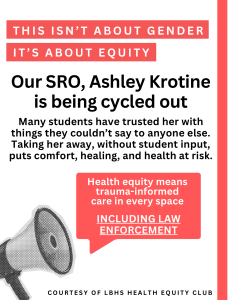School prepares for WASC accreditation visit

May 9, 2017
According to the Western Association of Schools and Colleges (WASC), “an accredited school is a statement to the broader community and the stakeholders that it is a trustworthy institution for student learning and committed to ongoing improvement.”
Every six years, WASC accredits schools based on their improvements since the previous accreditation cycle. LBHS is currently on our fifth year of WASC accreditation, meaning that next year, we will complete the cycle and begin again.
“WASC is a big deal. It is great to self-observe. This is a full-scale check,” said principal Chris Herzfeld.
WASC is a detailed process that functions continuously in order to improve high schools throughout California. It is an 18-month process that results in a completed document and digital portfolio of the evidence from our accreditation process. Our school, led by Carrie Denton and Cassandra Brooker, will analyze current data and look back to our improvement plan from six years ago to see how far we have come since the 2011-2012 school year.
WASC accreditation is judged on five categories: Assessments, Instruction, Curriculum, Organization, and Culture within the context of our school and our school’s past performance under these sections. By analyzing the data, the stakeholders determine critical areas of student need and develop our action plan for the next six years based on meeting these needs. It should be noted that the action plan is connected to the District’s LCAP action plan for our school. The focus groups, composed of all stakeholders, meet twice a month in various teachers’ classrooms. The meetings include teachers, parents, administrators, students, non-teaching staff and board members.
“Our two WASC coordinators reached out to a wide variety of parents and students representing different cross-sections of LBHS–students of different ethnicities, of different feeder schools, of different interests at school, to make sure we have a broad representation,” said Herzfeld. “It is important to represent different sections of the campus and community in our self-evaluation.”
Our WASC accreditation visit from stakeholders is tentatively scheduled for the third week in March 2018. The committee of about eight people will meet with parents on Sunday; on Monday and Tuesday, they will walk around school to meet with specific focus groups. The group will leave on Wednesday and answer a series of questions that lead to a recommendation of accreditation. Most schools earn the 6-year accreditation, but it does come with either a 1 or 2 day check-in at the 3-year mark. This involves a less-extensive report from the school. LBHS will tentatively know its accreditation status by the end of summer 2018.
We are currently in year 5 of our 6-year accreditation term. In 2015, at our mid-term visit, WASC applauded the student supports that are embedded in LBHS—academic supports, social and emotional supports, and a staff that cares about student success.
“The school really cares that every student is being successful—that every student is okay. When kids hurt, we hurt. And we can’t always fix their hurt. And that hurts. We want students to feel emotionally secure, psychologically and physically safe, and we also want them to feel challenged,” said Herzfeld.
The WASC team also noted our innovative instructional practices as a strength.
“If we look at survey data and physical evidence, what students have here are state-of-the-art classrooms, supplies and technology,” said Herzfeld. “It’s not gimmicks. What is common here is not common in other schools in terms of our ability to seamlessly use computers and technology in our classrooms and to have teachers able to use these [as well].”
Within our self-evaluation, we identified that our advisory program was not fulfilling its full potential and that our math scores were not yet where we wanted them to be. We have also recognized the desire to continue building a positive student culture. Next year’s visit will involve an explanation of how we have worked to improve upon these areas.
“We have our issues here and there, but through Link Crew, the House of Reps, the Athletic Leadership Team and ASB, our focus has been at large about building a positive school culture and breaking apart cliques and negativity from the landscape,” said Herzfeld.
Student contribution to the WASC document is essential and encouraged. Students have forums for expressing their thoughts and opinions through the House of Representatives, WASC Focus Groups and various surveys administered by the school and district office. This WASC document is meant to capture what we are doing right now as a school, analyze its effectiveness and develop a plan for improvement. There is nothing that students should feel that they need to do differently, since this would not provide the authentic data we are after.
“We want students to be kind to one another, to be engaged in their learning and to be responsible every day. We want that to be normal, and to normalize that, we need to practice PRIDE every day,” said Herzfeld.
Denton and Brooker, as WASC co-chairs, are confident that LBHS will receive accreditation. They are coordinating among teachers, administrators, district office staff, students and parents to ensure that the document reflects all stakeholders. Gathering data and organizing communication forums, the pair will eventually use the data collected to develop a list of student learning needs. From there, they will propose an action plan for the school to follow for the next six years, based on the needs of students. This action plan will reflect quantifiable data about the school and its stakeholders and perception data from surveys such as the LCAP and climate survey administered by the district.
“In my opinion, LBHS stands out in terms technology use in the classroom, engagement strategies to ensure that all students are learning, supports for all students and that our facilities are becoming more conducive to 21st-century learning. All classes have access to the materials necessary to give our students a high-quality, experience-based education. All classes hold students to a high standard of excellence so that they can be highly successful in future endeavors. I am confident that we will continue our accreditation and we will set the standard for other students in the aforementioned ways,” said Brooker.






